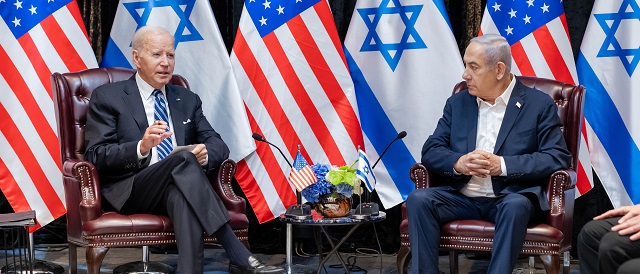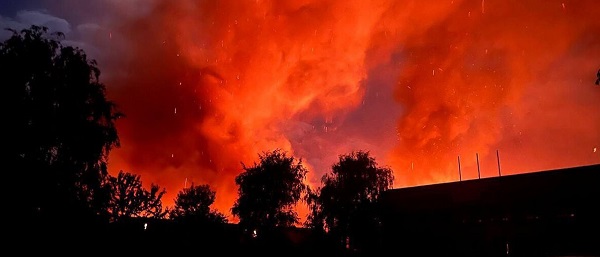conflict
‘This Is A Setback’: Did Biden’s Gaza Ceasefire Dreams Get Blown Up With A Top Hamas Leader?

From the Daily Caller News Foundation
By JAKE SMITH
The Biden administration’s Gaza ceasefire hopes may be fading in the wake of a top Hamas leader being assassinated deep inside Iran, defense experts told the Daily Caller News Foundations.
The administration and several international negotiators have spent months trying to broker a deal between Israel and Hamas for a ceasefire and the release of the hostages in Gaza, with officials suggesting in recent weeks that remaining “gaps” could be soon narrowed to reach an agreement. But the assassination of Ismail Haniyeh, a key negotiator in the deal, will likely complicate ceasefire talks and erase months of progress, experts told the DCNF.
Israel has not taken credit for the killing, but Iran and Hamas were quick to assign blame regardless, and some reports indicate that the Israeli forces were secretly behind the operation. His assassination underscores the unique position Israel has found itself in over the last several months — working tirelessly to defeat the terrorist group while trying to negotiate with them at the same time, experts told the DCNF.
“The implication here is that the ceasefire talks and hostage talks are set back a while, to the extent that anyone believed that they were going to happen at all,” Gabriel Noronha, executive director at Polaris National Security and former State Department official, told the DCNF. “From Hamas’ side, internally, they’re not going to feel like doing anything with Israel anytime soon.”
“Talking while fighting is hard under the best of circumstances… it’s a weird thing to do at all, although you have to do it. [The U.S. has] done it, of course, but when you kill the actual negotiator, it’s going to be very hard to find somebody who wants to play that role in the future, because you are now both a diplomat and a target,” Justin Logan, director of defense and foreign policy at the Cato Institute, told the DCNF. “It would be remarkable to me if anybody told you they didn’t think this was a setback for diplomacy.”
Haniyeh joined Hamas in 1997 and led the terrorist group’s political wing since 2017, according to The Washington Post. He was sanctioned by the U.S. and wanted by the International Criminal Court (ICC).
In the ongoing war in Gaza, Haniyeh represented Hamas during ceasefire negotiators with Qatari and Egyptian meditators. Though his death is not unwelcomed by the West, it threatens to complicate ongoing negotiations with Hamas.
Biden officials are now scrambling to keep the deal alive, according to several reports. The strike against Haniyeh in Iran caught the Biden administration by surprise, U.S. officials told The Wall Street Journal.
“This is something we were not aware of or involved in,” U.S. Secretary of State Antony Blinken said in an interviewduring a trip to Singapore , adding that he did not know “what this [meant]” for ongoing ceasefire discussions. The State Department referred the DCNF to deputy spokesman Vedant Patel’s comments during a press briefing on Wednesday, in which he echoed Blinken’s comments that he didn’t want “to speculate on any potential impacts.”
President Joe Biden held a “tough” phone call with Israeli Prime Minister Benjamin Netanyahu on Thursday to express his frustration that Israel would choose to kill Haniyeh at such a pivotal time for the ceasefire talks, even though his death as a general matter would not be upsetting to the U.S., two U.S. officials told Axios. The phone call was reportedly emotional as Biden “raised his voice” at Netanyahu toward the conclusion of the discussion, insisting that he wanted a ceasefire deal reached within “a week to two weeks,” an Israeli official with direct knowledge of the discussions told Axios.
The Biden administration and the Israeli government have seemingly been at odds for months on how to achieve a ceasefire. Biden put forward a ceasefire proposal in May that he claimed was penned by the Israelis, but Netanyahu seemed to reject the proposal shortly after it was announced.
“I think it’s clear that they have not been synced up on the ceasefire approach at all,” Logan told the DCNF. “Part of it is wishful thinking on the part of the Biden people that, you know, ‘we believe Netanyahu should want this, therefore he probably does want it’ — and they’re not listening to what Netanyahu is saying in reality. I think there has to be some frustration there and a feeling that the world’s only superpower has little leverage to control this situation.”
Biden also spoke with Netanyahu about Iran and Hezbollah’s potential retaliation, given that both have promised revenge for the strikes in Lebanon and Iran on Tuesday. Israeli forces claimed responsibility for an airstrike in Beirut, Lebanon, on Tuesday which successfully killed a high-level Hezbollah commander, just hours before the separate strike in Iran.
The two world leaders discussed joint U.S.-Israeli military operations that would stage a defense in the event of an attack, and U.S. Secretary of Defense Lloyd Austin informed his Israeli counterparts on Thursday about U.S. force posture changes in the Middle East, according to Reuters and Axios.
Biden told Netanyahu during their Thursday phone call, however, that should Israel stage a similar operation as it did earlier this week, he shouldn’t expect the U.S. to come to its defense, one U.S. official told Axios.
“I had a very direct meeting with the prime minister today. Very direct,” Biden told reporters on Thursday evening following his call with Netanyahu. When asked whether Haniyeh’s death would impact ceasefire talks, Biden said “It’s not helped.”
Featured Image Credit: Official White House Photo by Cameron Smith
Artificial Intelligence
AI Drone ‘Swarms’ Unleashed On Ukraine Battlefields, Marking New Era Of Warfare


From the Daily Caller News Foundation
Artificial intelligence-powered drones are making their first appearances on the battlefield in the Russia-Ukraine war as warfare creeps closer to full automation.
In bombardments on Russian targets in the past year, Ukrainian drones acting in concert were able to independently determine where to strike without human input.
It’s the first battlefield use of AI “swarm” technology in a real-world environment, a senior Ukrainian official and Swarmer, the company who makes the software, told the Wall Street Journal in a Tuesday report. While drones have increasingly defined modern battlefields, swarms until now had been confined to testing rather than combat.
“You set the target and the drones do the rest,” Swarmer Chief Executive Serhii Kupriienko told the WSJ. “They work together, they adapt.”
So far, the Swarmer technology has been used hundreds of times to target Russia assets, but was first used a year ago to lay mines on the front, the Ukrainian official told the WSJ. The software has been tested with up to 25 drones at once, but is usually utilized with only three.
Kupriienko told the WSJ that he was preparing to test up to 100 drones at once with the linking software.
A common arrangement used on the battlefield includes one reconnaissance drone to scout out the target and two explosive drones delivering the payload on target, the official told the WSJ.
While Western nations such as the U.S., France and the United Kingdom are also pursuing drone swarm technology, they have not deployed swarm technology on the battlefield the way Ukraine has, according to the WSJ. Currently, autonomous weapons are not regulated by any international authority or binding agreement, but ethical concerns around the technology has led many to call for increased regulation of weapons like the Swarmer system.
The Ukrainian Ministry of Foreign Affairs did not immediately respond to the Daily Caller News Foundation’s request for comment.
conflict
Trump Pentagon Reportedly Blocking Ukraine From Firing Western Missiles Deep Into Russia


From the Daily Caller News Foundation
The Department of Defense has spent months blocking the Ukrainian military from using American and British-made missiles to hit targets deep inside Russia, The Wall Street Journal reported Sunday, citing unnamed U.S. officials.
Undersecretary of Defense for Policy Eldridge Colby reportedly designed the procedure to review requests to carry out the long-range strikes with weapons that are either of U.S. origin or that require American intelligence or use components provided by the U.S., according to the WSJ. Secretary of Defense Pete Hegseth reportedly has the final say on whether Ukrainian forces can use the MGM-140 ATACMS (Army Tactical Missile System) to hit targets in Russia.
The reported blocks on missile strikes coincides with a Trump administration effort to broker a peace deal between Russia and Ukraine. A Pentagon spokesperson declined to comment further on the matter.
BREAKING: President Vladimir Putin reacts to B-2 Flyover pic.twitter.com/1mzVn7DxlW
— Jack Poso 🇺🇸 (@JackPosobiec) August 15, 2025
The Biden administration allowed Ukraine to carry out strikes with ATACMS in November, weeks after President Donald Trump won the 2024 election, the New York Times reported. Trump criticized the move during a December interview with Time magazine.
“It’s crazy what’s taking place. It’s crazy,” Trump said. “I disagree very vehemently with sending missiles hundreds of miles into Russia. Why are we doing that? We’re just escalating this war and making it worse. That should not have been allowed to be done.”
Trump and Russian President Vladimir Putin met in Alaska on Aug. 15 for a summit meeting during which Trump sought to secure a cease-fire in Russia’s war with Ukraine. As Trump greeted Putin, a B-2A Spirit stealth bomber and several fighters carried out a flyover of Elmendorf Air Force Base.
Trump met with Ukrainian President Volodymyr Zelensky and major European leaders on Aug. 18 to update them on the summit.
In July, Trump reached an agreement with NATO where members of the alliance would purchase weapons, including MIM-104 Patriot surface-to-air missiles, and donate them to Ukraine.
-

 Agriculture1 day ago
Agriculture1 day agoHealth Canada indefinitely pauses plan to sell unlabeled cloned meat after massive public backlash
-

 COVID-192 days ago
COVID-192 days agoCrown seeks to punish peaceful protestor Chris Barber by confiscating his family work truck “Big Red”
-

 Indigenous2 days ago
Indigenous2 days agoCanadian mayor promises to ‘vigorously defend’ property owners against aboriginal land grab
-

 Carbon Tax6 hours ago
Carbon Tax6 hours agoCanadian energy policies undermine a century of North American integration
-

 Alberta2 days ago
Alberta2 days agoPremier Danielle Smith says attacks on Alberta’s pro-family laws ‘show we’ve succeeded in a lot of ways’
-

 Crime1 day ago
Crime1 day agoFBI Seizes $13-Million Mercedes Unicorn From Ryan Wedding’s Narco Network
-

 Energy3 hours ago
Energy3 hours agoPoilievre says West Coast Pipeline MOU is no guarantee
-

 Alberta3 hours ago
Alberta3 hours agoWest Coast Pipeline MOU: A good first step, but project dead on arrival without Eby’s assent




